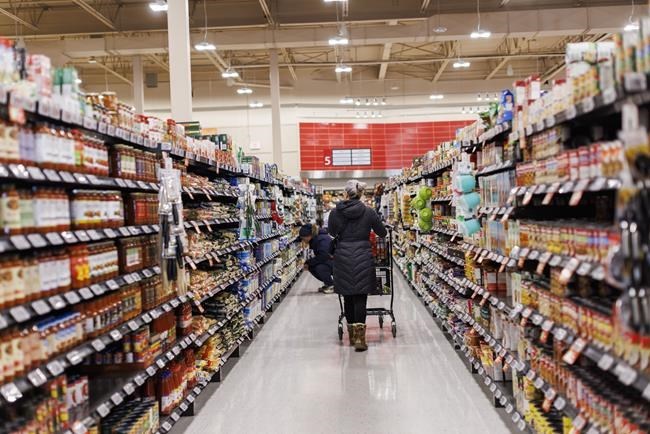Here is a roundup of stories from The Canadian Press designed to
bring you up to speed on what you need to know today...
Canadians feel grocery inflation worsening: poll
Almost two-thirds of Canadians feel that inflation at the grocery store is getting worse, a new poll suggests, even as food inflation has been steadily cooling.
A new Leger survey found that almost 30 per cent of Canadians believe food inflation has been primarily caused by grocery stores trying to increase profit margins. Another 26 per cent think it’s mostly due to global economic factors, while one in five blame the federal government
Statistics Canada said that grocery inflation was 1.4 percent in April, helping drive overall inflation lower to 2.7 percent.
However, even low inflation still means prices are going up. And over the past three years, grocery prices have risen 21.4 per cent, according to the agency.
The major grocers have said they did not unduly profit from inflation, amid political and public pressure over the rising cost of food and other necessities.
Banks to report Q2 results amid credit concerns
While there’s still room for surprises, Canadian banks are set to report results after a second quarter that was notable for its economic steadiness.
The quarter marked a sharp contrast from a year earlier, when bank failures in the U.S. and Switzerland created worries of contagion. At the same time, the possibility of an economic hard landing loomed as central banks worked to tame inflation through higher interest rates.
By comparison, the latest quarter was fairly tame — despite the high-profile issues at TD Bank Group related to money-laundering controls — with encouraging data on the economic front for inflation and still historically low levels of mortgage delinquencies.
Just this week, Statistics Canada reported inflation fell to 2.7 per cent in April, down from 2.9 per cent in March, which boosted financial market odds of a June rate cut above 50 per cent.
But with both the timing and pace of rate cuts uncertain, and the many Canadian mortgages up for renewal soon at significantly higher rates, analysts will keep focusing on the issue of how well bank loans are expected to stand up.
Senate empowers independent groups, riles Tories
Canada's upper house has adopted a new set of rules that the Liberal government says will further entrench its independence, as the dominos from Prime Minister Justin Trudeau's Senate reforms continue to fall.
The large majority of senators voted in favour of the sweeping changes earlier this month.
But the Conservatives — whose numbers have dwindled down to just 13 seats — say the government is trying to weaken their position in the Senate and hamstring future Tory governments.
The new rule changes give more power to each of the groups recognized by Senate modernization legislation that Parliament passed in 2022.
Rather than mimicking the dual roles of government and Opposition in the House of Commons, the Senate now gives additional groups similar powers and additional speaking time during debates.
Indigenous CBC worker granted human-rights hearing
An Indigenous employee with the Canadian Broadcasting Corp. is taking up the fight against what he describes as systemic racism by his employer.
Richard Agecoutay, 61, has been granted a human-rights hearing over claims of discrimination at the public broadcaster, where he's worked since 2001.
It's an effort to knock down barriers for others, he said in an interview.
"You don't have to suffer systemic racism or racism in the workplace. You have avenues to pursue it."
Agecoutay, a videographer for CBC in Regina, alleges he has repeatedly been denied work due to his race, and that the broadcaster offered a settlement, but he would have had to sign a non-disclosure agreement.
Documents filed with the Canadian Human Rights Tribunal detail several instances in which Agecoutay said he was denied work.
Trial to hear about letters from serial killer
Crown prosecutors are set to wrap up their evidence today in the trial of a Winnipeg man who has admitted to killing four Indigenous women.
Court is expected to hear about letters Jeremy Skibicki sent to an inmate about the charges he's facing.
Skibicki has pleaded not guilty to first-degree murder in the 2022 slayings of Rebecca Contois, Morgan Harris, Marcedes Myran and an unidentified woman Indigenous leaders have named Buffalo Woman.
His lawyers say he killed the women but argue he should be found not criminally responsible due to mental illness.
Prosecutors say the killings were racially motivated and Skibicki preyed on the vulnerable victims at homeless shelters.
Skibicki's lawyers have said an expert will later testify to Skibicki's mental state at the time of the killings.
First Nations leader: Little changed since Pickton
An Indigenous leader in British Columbia says little has changed since the crimes of serial killer Robert Pickton, as community members reflect on news that he is in life-threatening condition after being attacked in prison.
Chief Marilyn Slett with the Heiltsuk Tribal Council in Bella Bella, B.C., says discussion about Pickton after the assault at a Quebec prison on Sunday has revived painful memories for the Indigenous community.
Slett, who is also secretary-treasurer at the Union of BC Indian Chiefs, says Indigenous women still face a barrier of systemic racism when it comes to personal safety and access to the justice system when they are victims of crimes.
Pickton was convicted of six counts of second-degree murder and sentenced to life in prison in 2007 after being charged with the murders of 26 women, many of them Indigenous.
---
This report by The Canadian Press was first published May 22, 2024
The Canadian Press



